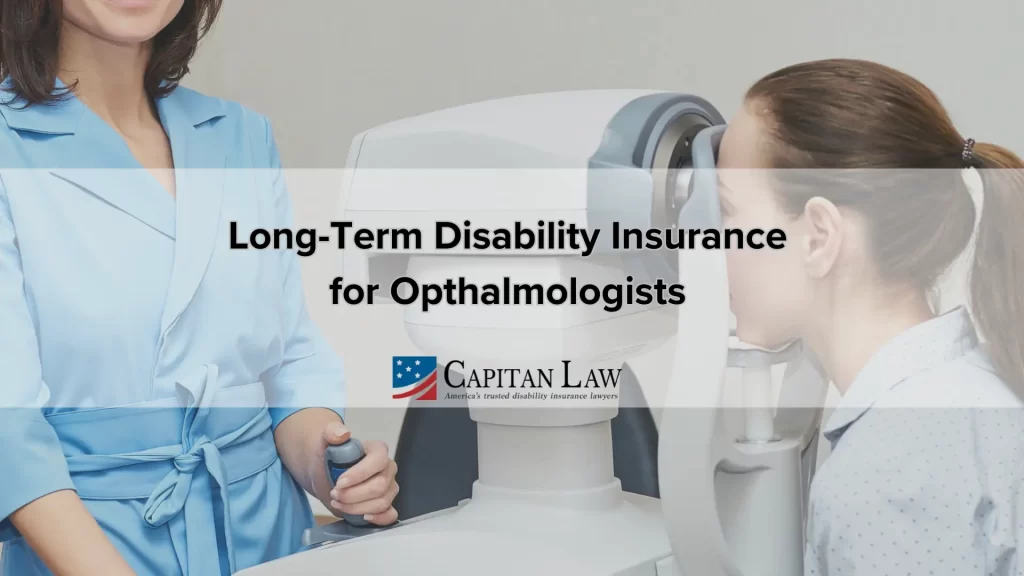
Long-Term Disability Insurance for Ophthalmologists
Few ophthalmologists plan on suffering a career-ending disability, but preparing for that possibility is crucial. That’s why long-term disability insurance exists. However, when insurance companies don’t honor their policies, disabled ophthalmologists can suffer severe financial stress and might not have the money they need to provide for themselves.
The long-term disability insurance attorneys at Capitan Law can help if your insurer won’t honor their policy. We have seen how insurance companies leave policyholders hanging out to dry and can represent you in your legal dispute. Our attorneys know all the ins and outs of disability policies and can present a compelling case on your behalf. We’ll handle all the technical details and make the legal process as simple as possible. Call us today at (267) 419-7888 or fill out our contact form for a consultation.
What Is Long-Term Disability Insurance?
When you can’t work for a long time after an accident or illness, long-term disability insurance provides replacement income and other benefits, helping you to keep your financial life stable. With it, you can continue to meet your obligations, including paying for your home, taking care of your family, or covering medical bills. The specific benefits of long-term disability insurance vary across policies but typically include:
- Income replacement: If an injury or illness keeps you from working for several months or longer, a long-term disability policy can provide you with money to make up for that last income. (Most policies don’t kick in unless your disability lasts at least 90 days, and some have longer waiting periods.) Many policies cover between 50 and 60 percent of your lost income, though some will cover a higher percentage. Depending on your condition and your policy’s terms, this replacement income typically lasts until you heal from your disability, reach retirement age, or can find another job.
- Rehabilitation benefits: Many long-term disability policies will cover the cost of rehabilitative services to help you return to your job or find a new career. This coverage may include money for physical therapy, occupational therapy, speech therapy, or other treatments.
- Survivor benefits: Thinking about worst-case scenarios is never pleasant, but preparing for unexpected events is important. Many long-term disability policies include survivor benefits that pay a lump sum to your family if something happens to you. This coverage can provide financial protection for your family in case of a fatal injury or illness.
Finally, don’t underestimate the peace of mind a long-term disability insurance policy can provide. Knowing that you have a support system if the worst happens means you can focus on caring for your patients instead of worrying about a possible financial disaster.
 LTD Insurance vs. Workers’ Compensation
LTD Insurance vs. Workers’ Compensation
One common question we receive about long-term disability insurance claims is how these policies relate to and might affect a workers’ comp claim. There are several key differences between workers’ compensation and long-term disability insurance, and understanding these differences is essential to protecting your financial future.
First and foremost, workers’ compensation only applies if you sustain a job-related injury or illness. By contrast, long-term disability insurance covers any disabling injury or illness, even those unrelated to your work.
The second critical difference between workers’ compensation and long-term disability insurance is how long the benefits last. In most cases, workers’ comp benefits last until you heal from your injury or illness, you reach the point where further treatment won’t meaningfully affect your disability, or a certain amount of time has passed. On the other hand, many long-term disability policies will provide benefits until you reach retirement age, possibly even longer. Workers’ compensation can be a big help in the short term, but if you’re going to miss several years or more of work, you’ll want long-term disability insurance.
It’s worth noting that you might be able to claim workers’ compensation and long-term disability insurance for a job-related injury. An attorney can tell you more about your benefits and explain the best option for your situation.
Frequent Issues With Ophthalmologist Long-Term Disability Claims
In the often complex landscape of long-term disability insurance, ophthalmologists can encounter various issues when making a claim. Some of these common problems include:
- Misinterpreting a Policy’s Terms: Insurance policy language can be intricate and confusing. You may find that the insurer’s interpretation of the policy terms does not match your understanding, leading to disputes over what is covered.
- Disability Definition Disputes: Many policies distinguish between “own occupation” and “any occupation” when defining disability. In other words, are you unable to perform your specific job as an ophthalmologist, or are you unable to work in any job? This distinction can significantly impact your eligibility for benefits.
- Insufficient Medical Evidence: Insurers require solid medical documentation to approve a claim. If they say the evidence you provided is insufficient or unclear, they may deny your claim.
- Pre-Existing Condition Exclusions: If your disability is related to a condition that existed before you took out the insurance policy, the insurer might reject your claim based on a pre-existing condition exclusion.
- Delayed or Denied Claims: Sometimes, insurers may delay the processing of a claim or deny it outright without a clear or fair reason.
- Surveillance and Privacy Concerns: Some insurers use surveillance tactics to try to disprove disability claims. This practice can feel invasive and create additional stress during an already difficult time.
Ways Our Long-Term Disability Insurance Attorneys Can Help
Our legal team knows that when you’ve suffered a long-term disability, an issue with an insurance claim can create intense stress and headaches. We want you to focus on healing and rebuilding your life, not fighting a complex legal battle. We can help you with your long-term disability claim by:
- Providing Experienced Guidance: An attorney can help you understand the often confusing terms of insurance policy language. They can interpret your policy accurately, clarify your rights, and explain your insurer’s obligations.
- Claim Preparation: A seasoned attorney can guide you in preparing a strong claim, ensuring that all the required medical evidence is comprehensive and properly documented. This makes it more likely the insurer will approve your claim.
- Negotiating for a Fair Settlement: In disputes over policy interpretation or benefit amounts, your attorney can negotiate with the insurance company on your behalf. They’re skilled in the art of negotiation and can advocate for the best possible outcome.
- Appeal Denials: If your claim is unfairly denied or delayed, your attorney can help you file an appeal. They can provide the necessary legal arguments and documentation to strengthen your case.
- Litigation: If all else fails, your attorney can take the matter to court. They can represent you in a lawsuit against your insurance company to ensure you receive the benefits you deserve.
Our Long-Term Disability Attorneys Are Ready to Fight for You
You purchased long-term disability insurance to prepare for an emergency, and we’re here to help you ensure your insurer honors your policy. We have offices in Pennsylvania and Kentucky, and we’re proud to represent clients in those states and New Jersey. Call Capitan Law today at (267) 419-7888 or reach out online for a consultation.
Related Posts:
 LTD Insurance vs. Workers’ Compensation
LTD Insurance vs. Workers’ Compensation